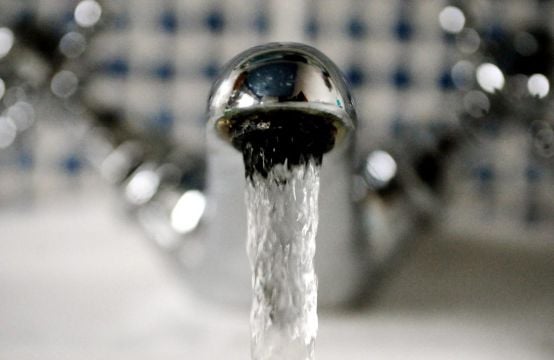Ireland has been found guilty of failing to fulfil its obligations under EU legislation to ensure drinking complied with standards relating to dangerous chemical compounds in water supplies.
The Court of Justice of the EU ruled the concentration of trihalomethanes (THMs) in drinking water in a large number of public water supplies in the Republic had persistently exceeded recommended safety limits since at least 2012, while the deadline for compliance had been 2003.
The CJEU said Ireland could not fully justify the persistent failure to fulfil its obligations as excessive levels of THMs had been found in drinking water in Ireland “over a considerable time period.”
THMs are chemical compounds found in drinking water, especially in water treatment systems that use chlorine to remove bacteria and other contaminants.
They are formed as a result of interaction between organic materials such as soil and rotting vegetation and chlorine.
THMs are considered dangerous to both human health and the environment with high levels of THMs linked to diseases of the liver, kidney and central nervous system as well as bladder and colon cancer.
They can also cause gastrointestinal problems and skin irritation.
The findings by the CJEU relate to 21 public water supplies and nine private water group schemes.
The public water schemes include those supplying drinking water to Kilkenny c=City; Bray, Co Wicklow; Schull, Co Cork; Ring, Co Waterford; Glenties, Co Donegal; Greystones, Co Wicklow; and Granard, Co Longford.
The CJEU also ruled that Ireland failed to adopt as quickly as possible the necessary corrective measures to restore the quality of drinking water in these areas.
It noted that notice of a reasoned opinion of an alleged breach by Ireland was issued over 17 years after the deadline for complying with the EU directive on drinking water.
'Slow to act'
The European Commission claimed the creation of Irish Water (now Uisce Éireann) merely demonstrated that Ireland had been slow to act given its deadline for compliance with EU standards was 10 years earlier.
It initiated legal proceedings against Ireland after it was dissatisfied with the response of Irish authorities to requests for information on how they were ensuring drinking water in Ireland was complying with EU legislation.
The Government was first informed by Brussels in May 2015 that it was not meeting the requirements of an EU directive in relation to THMs.
Originally, the European Commission claimed there were excessive THM levels in 73 public water supplies affecting a population of over 481,000 as well as 22 private group water schemes supplying almost 23,000 people.
The European Commission issued a reasoned opinion in May 2020 that Ireland was failing to meet its obligations relating to drinking water standards, with legal proceedings initiated after unsatisfactory responses were provided by the Government in progress reports supplied between September 2020 and June 2021.
The ruling by the Luxembourg-based court on Thursday requires Ireland to comply with the judgment without delay, as well as pay the legal costs of the case.
Drinking water
The European Commission may also bring a further action seeking financial penalties for any ongoing delay in complying with the EU directive on drinking water standards.
The CJEU dismissed an application by lawyers for the Irish Government stating the action relating to three public water schemes in Drimoleague, Co Cork; Ring/Helvick, Co Waterford; and Grangemore, Co Kildare should be inadmissible as they no longer exist.
It also rejected the legal argument by Ireland that the EU directive did not impose an obligation to achieve a result, while also arguing the European Commission had not provided sufficient evidence about the alleged failure to meet the standards on drinking water.
Ireland claimed the failure of the 22 public and nine private water schemes to comply with the maximum limits on THMs did not necessarily mean the State had failed to comply with its obligations under EU legislation.
It also argued that specific geographical and environmental factors such as the presence of peat and higher than average rainfall should be considered as they made compliance with EU standards challenging.
They claimed the necessary remedial measures often required the installation of new or substantially upgraded water treatment plants which required a significant amount of time and capital investment.
However, the CJEU said Ireland had failed to seek any of the available derogations on the issue.
It noted that estimated dates for when compliance would be achieved were deferred by Ireland each time it supplied a new progress report.
Testing and monitoring
Reacting to the news, Uisce Éireann said the CJEU ruling related to water supplies in 2020, when 21 public schemes were identified as exceeding recommended limits on THMs.
The company pointed out that the number of affected schemes has now reduced to five, with two of the supplies due to be removed from its remedial action list later this year.
Uisce Éireann said it had no role in relation to the operation of private group water schemes.
A company spokesperson said it continued to invest in infrastructure and improvement measures to adhere to EU standards in order to deliver world-class drinking water supplies for all its customers.
Uisce Éireann said its enhanced testing and monitoring programme had also enabled it to identify a number of additional sites where THM risks exist.
The spokesperson said it was important to assure customers that water from the remaining schemes is safe to drink.
Uisce Éireann said advice from the HSE is that the benefits of using chlorine to treat drinking water are much greater than any possible health risks from THMs.
It added that both the HSE and the Environmental Protection Agency are notified whenever THM levels are found above allowable limits to ensure any potential risk to public health is fully assessed.
The company highlighted how no “do not drink” notice had ever been imposed to date on water supplies due to high levels of THMs







